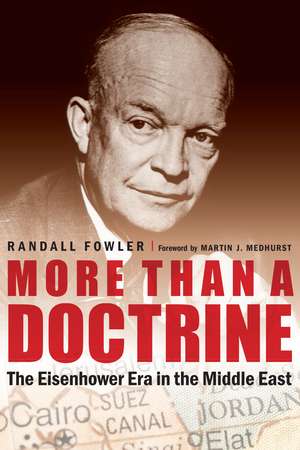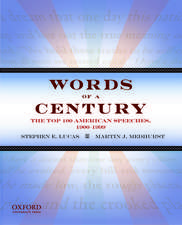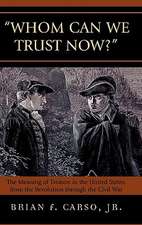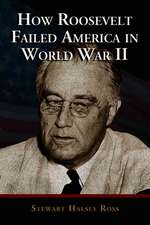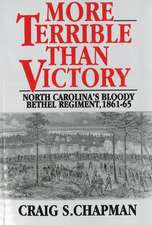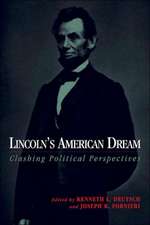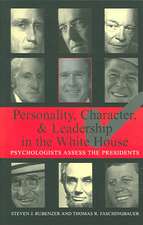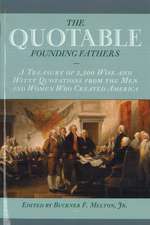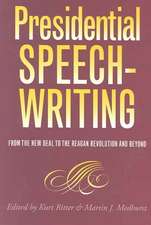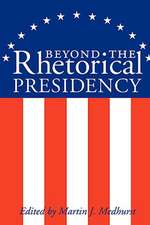More Than a Doctrine: The Eisenhower Era in the Middle East
Autor Randall Fowler Cuvânt înainte de Martin J. Medhursten Limba Engleză Hardback – mai 2018
Given on January 5, 1957, the Eisenhower Doctrine Address forever changed America’s relationship with the Middle East. In the aftermath of the Suez Crisis, President Dwight D. Eisenhower boldly declared that the United States would henceforth serve as the region’s “protector of freedom” against Communist aggression. Eighteen months later the president invoked the Eisenhower Doctrine, landing troops in Lebanon and setting an enduring precedent for U.S. intervention in the Middle East.
How did Eisenhower justify this intervention to an American public wary of foreign entanglements? Why did he boldly issue the doctrine that bears his name? And, most important, how has Eisenhower’s rhetoric continued to influence American policy and perception of the Middle East? Randall Fowler answers these questions and more in More Than a Doctrine. With the expansion of America’s global influence and the executive branch’s power, presidential rhetoric has become an increasingly important tool in U.S. foreign policy—nowhere more so than in the Middle East. By examining Eisenhower’s rhetoric, More Than a Doctrine explores how the argumentative origins of the Eisenhower Doctrine Address continue to impact us today.
How did Eisenhower justify this intervention to an American public wary of foreign entanglements? Why did he boldly issue the doctrine that bears his name? And, most important, how has Eisenhower’s rhetoric continued to influence American policy and perception of the Middle East? Randall Fowler answers these questions and more in More Than a Doctrine. With the expansion of America’s global influence and the executive branch’s power, presidential rhetoric has become an increasingly important tool in U.S. foreign policy—nowhere more so than in the Middle East. By examining Eisenhower’s rhetoric, More Than a Doctrine explores how the argumentative origins of the Eisenhower Doctrine Address continue to impact us today.
Preț: 229.19 lei
Nou
Puncte Express: 344
Preț estimativ în valută:
43.86€ • 45.90$ • 36.50£
43.86€ • 45.90$ • 36.50£
Carte disponibilă
Livrare economică 10-24 martie
Preluare comenzi: 021 569.72.76
Specificații
ISBN-13: 9781612349978
ISBN-10: 1612349978
Pagini: 272
Ilustrații: 1 map, 2 tables, index
Dimensiuni: 152 x 229 x 26 mm
Greutate: 0.56 kg
Editura: Potomac Books Inc
Colecția Potomac Books
Locul publicării:United States
ISBN-10: 1612349978
Pagini: 272
Ilustrații: 1 map, 2 tables, index
Dimensiuni: 152 x 229 x 26 mm
Greutate: 0.56 kg
Editura: Potomac Books Inc
Colecția Potomac Books
Locul publicării:United States
Notă biografică
Randall Fowler teaches rhetoric at the University of Maryland, College Park. He previously taught at Baylor University and at Jordan Applied University in Amman as a Fulbright instructor. Martin J. Medhurst is Distinguished Professor of Rhetoric and Communication and professor of political science at Baylor University. He is the founding editor of the journal Rhetoric and Public Affairs.
Cuprins
Foreword
Acknowledgments
Introduction
Eisenhower Doctrine Address
1. The Eisenhower Doctrine: A Species of Containment
2. Operation Ajax: Eisenhower’s Rhetoric of Misdirection
3. From Baghdad to Cairo: The Limits of Rhetorical Surreption
4. Lion’s Last Roar, Eagle’s First Flight: Eisenhower at Suez
5. The Doctrine Applied: Intervention in Lebanon and the Rhetoric of Justification
Conclusion
Notes
Bibliography
Index
Acknowledgments
Introduction
Eisenhower Doctrine Address
1. The Eisenhower Doctrine: A Species of Containment
2. Operation Ajax: Eisenhower’s Rhetoric of Misdirection
3. From Baghdad to Cairo: The Limits of Rhetorical Surreption
4. Lion’s Last Roar, Eagle’s First Flight: Eisenhower at Suez
5. The Doctrine Applied: Intervention in Lebanon and the Rhetoric of Justification
Conclusion
Notes
Bibliography
Index
Recenzii
"[A] thought-provoking and radical book that explores an explosive subject that is as relevant today as it was in 1957. Thoroughly researched, so that it includes some once top-secret materials that probably have had few eyes laid on them to-date."—Anna Faktorovich, Pennsylvania Literary Journal
"The Eisenhower Doctrine has long since faded from memory, and yet the doctrine and the rhetoric that accompanied it marked an important turning point in America’s approach to the Middle East. Even after the collapse of the Soviet Union, or ‘international communism’ as Eisenhower would have it, the doctrine remains relevant. It was the first full enunciation of interests—support for conservative allies, and ensuring that the region’s oil reached the global market—that continue to define much of Washington’s priorities."—Survival: Global Politics and Strategy
"Fowler skillfully uses the Eisenhower Doctrine as the lens through which to view America's developing relationship with the Middle East. . . . More Than a Doctrine is useful for readers interested in both history and the study of rhetoric."—Nicole Anslover, Kansas History
"More Than a Doctrine is an excellent study of the effects and impact of presidential rhetoric. It uses Eisenhower’s presidency to demonstrate the value of truthfulness in international affairs, and the necessity of not being swept away by an orator."—Mike Watson, Providence
“Randall Fowler’s timely and provocative book addresses an important and enduring question: How did Americans come to see the Middle East as an area of vital U.S. interest? . . . Grounded in the most important case studies of the 1950s, More Than a Doctrine illuminates the long-term significance of this critical turning point in American globalism, which set the stage for decades of regional entanglement.”—Kenneth Osgood, author of Total Cold War: Eisenhower’s Secret Propaganda Battle at Home and Abroad
“Deeply researched and cogently argued. . . . This study could not come at a more appropriate time.”—Jerry M. Long, associate professor in the Honors College and director of Middle East Studies at Baylor University and author of Saddam’s War of Words: Politics, Religion, and the Iraqi Invasion of Kuwait
“Fowler reveals the ways that future presidents were heirs of Eisenhower’s political precedents and rhetorical warrants that normalized U.S. interventionism as its dominant foreign policy in this war-torn region of the world.”—Shawn J. Parry-Giles, professor of communication at the University of Maryland and author of The Rhetorical Presidency, Propaganda, and the Cold War, 1945–1955
